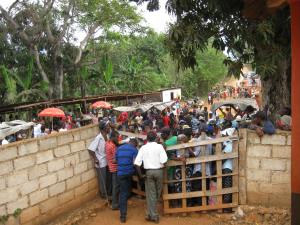St. Joseph Health joins CommonSpirit.org soon! Enjoy a seamless, patient-centered digital experience. Learn more
Dr. Stephen Braden slept on the floor of a packed guesthouse in rural Haiti, for a week. It had limited indoor plumbing and electricity but he loved

Braden, of St. Joseph Family Medicine in Bryan, was recently part of a 21-member, medical mission team to Haiti.
St. Joseph’s sponsors, the Sisters of St. Francis of Sylvania, Ohio helped organize the group, which was a joint effort among Sylvania Franciscan Health, Lourdes University College of Nursing, Mt. Carmel Hospital in Columbus, Ohio, and many generous donors.
Dr. Braden’s traveling companions included: nurse professors, a nursing student, a dentist, an ER physician, a pharmacist, an internal medicine physician, family medicine doctors and residents, a civil engineer and a mechanic.
“We had a lot of car trouble and needed the mechanic the most!” said Braden. “We had to change a flat tire every day to the point where we ran out of spares.”
The team was stationed for six nights at a guesthouse of Sister Josephine (Jo) Dybza and Sister Fidelis Rubbo, both of the Order of St. Francis, in the mountain village of Ferrier. Ferrier is a bumpy, 10-hour car ride to the southwest part of the country and about 180 miles from Port-au-Prince, Haiti’s capital. Port-au-Prince was badly damaged during a deadly, 7.0 magnitude earthquake in January 2010.
The sisters have been working in Ferrier and the nearest small coastal town, Pestel, since 2001. The area is poor, even by Haitian standards. The region suffers from Cholera, lack of clean water, malnutrition, parasites, TB, malaria and AIDS.
Sisters Fidelis and Jo identified four nearby villages and each day the team set up a makeshift clinic in a local school building.
“It was very rural, the villages had a few hundred people and others would walk in from the hillside or mountain,” said Braden.

A line of people would form at the school’s entrances before the clinics opened each morning.
“We saw everyone who was there and wanted to be seen. It took a while because of the language barrier,” said Braden.
Though patients provided basic information at registration, sometimes the medical French Dr. Braden knew, wasn’t enough.
“If you wanted to ask extra questions or explain extra things you needed language help and needed to wait for the translator,” said Braden. “There was a lot of gesturing.”
A translator from the United Nations accompanied the team. The group saw around 200 patients a day.

“They paid in smiles and hugs, it was very heartfelt, it didn’t take a language to get that across,” said Braden.
Though a clinic in Ferrier is staffed by an RN, LPN and other part-time staff, one day a week, according to Braden, many of the patients he saw didn’t use it.
“Even if they had access to go to that one doctor that lived in town, which they would only go if at death’s door, the doctor would write a prescription but the pharmacy wouldn’t have it and the people wouldn’t have money to pay for it,” said Braden.
“If you gave them Tylenol or vitamin or cough medicine, to them it would be a tremendous gift. They were appreciative even for the simplest things that we would take for granted. Even just to have a dentist that could pull out teeth.”
Everyone who registered was given vitamins and anti-parasite medication.
“The health department there recommends that they take those pills two-to-three times year unless they have a system with purified water,” said Braden. “There is a problem keeping livestock and trash out of the water supply.
Thanks to donations, the sisters ordered 150 water filtration units. The systems were purchased in country to help support the Haitian economy. Families in each of the four villages received them.
“A clean source of water prevents a GI (gastrointestinal) infection,” said Braden, who noted the system worked by filtering water in a 20-gallon bucket through a ceramic pot inside the bucket. Each system is designed to last three years.
The team trained a group of people in each village to maintain the units. They were also given a stethoscope and instructed on how to listen to the lungs for pneumonia as well as how to deliver babies.

“They assigned one or two to each of us to teach them to do some basic wound care,” said Braden. “We had people that came in with pretty nasty burns – just to teach them how to wrap was big, so they could turn to someone for help.”
Dr. Braden has been on numerous medical mission trips and says he takes just as much away from them as the people being ministered to.
“They feel like God is connecting with them and that He cares,” said Braden.
He encourages any St. Joseph team members interested in a mission trip, to contact him.
Publish date:
Friday, March 28, 2014Looking for a doctor? Perform a quick search by name or browse by specialty.